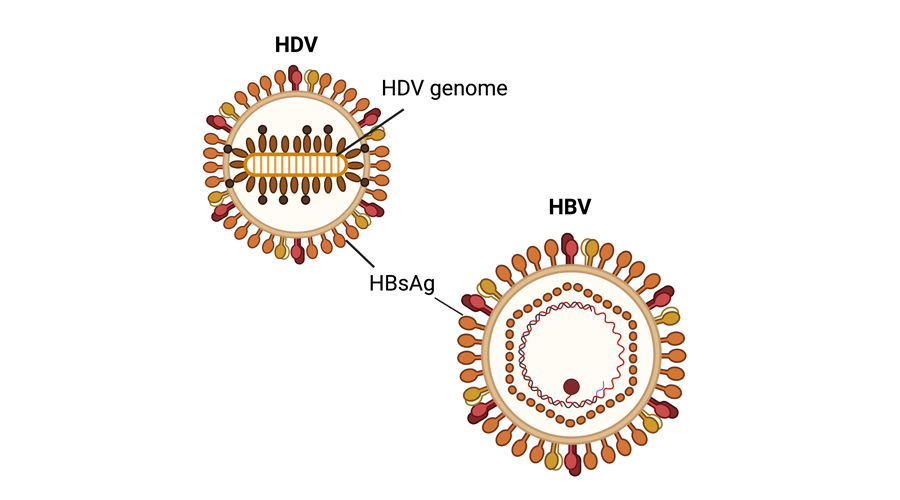Publications 2023
3P and 5P models of limited value for the detection of clinically significant portal hypertension in patients with hepatitis delta. Sandmann L, Tergast TL, Wedemeyer H, Deterding K, Maasoumy B. J Hepatol. 2023 Jul;79(1):e47-e49. doi: 10.1016/j.jhep.2023.01.004. Epub 2023 Jan 18. PMID: 36669702.
A Phase 3, Randomized Trial of Bulevirtide in Chronic Hepatitis D. Wedemeyer H, Aleman S, Brunetto MR, Blank A, Andreone P, Bogomolov P, Chulanov V, Mamonova N, Geyvandova N, Morozov V, Sagalova O, Stepanova T, Berger A, Manuilov D, Suri V, An Q, Da B, Flaherty J, Osinusi A, Liu Y, Merle U, Schulze Zur Wiesch J, Zeuzem S, Ciesek S, Cornberg M, Lampertico P; MYR 301 Study Group. N Engl J Med. 2023 Jul 6;389(1):22-32. doi: 10.1056/NEJMoa2213429. Epub 2023 Jun 22. PMID: 37345876.
Bile acid increase during bulevirtide treatment of hepatitis D is not associated with a decline in HDV RNA. Deterding K, Xu C, Port K, Dietz-Fricke C, Xun J, Maasoumy B, Cornberg M, Wedemeyer H. J Viral Hepat. 2023 Jul;30(7):597-606. doi: 10.1111/jvh.13831. Epub 2023 Mar 28. PMID: 36924318.
Clinical long-term outcome of hepatitis D compared to hepatitis B monoinfection. Wranke A, Heidrich B, Deterding K, Hupa-Breier KL, Kirschner J, Bremer B, Cornberg M, Wedemeyer H. Hepatol Int. 2023 Dec;17(6):1359-1367. doi: 10.1007/s12072-023-10575-0. Epub 2023 Oct 3. PMID: 37789170; PMCID: PMC10661878.
HDV RNA assays: Performance characteristics, clinical utility, and challenges. Wedemeyer H, Leus M, Battersby TR, Glenn J, Gordien E, Kamili S, Kapoor H, Kessler HH, Lenz O, Lütgehetmann M, Mixson-Hayden T, Simon CO, Thomson M, Westman G, Miller V, Terrault N, Lampertico P; HDV RNA Assays Writing Group at the HBV Forum. Hepatology. 2023 Aug 28. doi: 10.1097/HEP.0000000000000584. Epub ahead of print. PMID: 37640384.
Interferon-based treatment of chronic hepatitis D. Sandmann L, Wedemeyer H. Liver Int. 2023 Aug;43 Suppl 1:69-79. doi: 10.1111/liv.15410. Epub 2022 Sep 2. PMID: 36002390.
Kinetics and predictive value of HBcrAg, HBV RNA and anti-HBc during bulevirtide treatment of chronic HDV-infected patients. Sandmann L, Deterding K, Bremer B, Port K, Cornberg M, Wedemeyer H, Maasoumy B. J Viral Hepat. 2023 Apr;30(4):283-286. doi: 10.1111/jvh.13804. Epub 2023 Jan 23. PMID: 36648369.
Treating hepatitis D with bulevirtide – Real-world experience from 114 patients. Dietz-Fricke C, Tacke F, Zöllner C, Demir M, Schmidt HH, Schramm C, Willuweit K, Lange CM, Weber S, Denk G, Berg CP, Grottenthaler JM, Merle U, Olkus A, Zeuzem S, Sprinzl K, Berg T, van Bömmel F, Wiegand J, Herta T, Seufferlein T, Zizer E, Dikopoulos N, Thimme R, Neumann-Haefelin C, Galle PR, Sprinzl M, Lohse AW, Schulze Zur Wiesch J, Kempski J, Geier A, Reiter FP, Schlevogt B, Gödiker J, Hofmann WP, Buggisch P, Kahlhöfer J, Port K, Maasoumy B, Cornberg M, Wedemeyer H, Deterding K. JHEP Rep. 2023 Mar 15;5(4):100686. doi: 10.1016/j.jhepr.2023.100686. PMID: 37025462; PMCID: PMC10071092.
Publications 2021
Residual low HDV viraemia is associated HDV RNA relapse after PEG-IFNa-based antiviral treatment of hepatitis delta: Results from the HIDIT-II study. Bremer B, Anastasiou OE, Hardtke S, Caruntu FA, Curescu MG, Yalcin K, Akarca US, Gurel S, Zeuzem S, Erhardt A, Luth S, Papatheodoridis GV, Radu M, Idilman R, Manns MP, Cornberg M, Yurdaydin C, Wedemeyer H. Liver Int 2021;41(2):295-299
Liver-Resident Bystander CD8 T Cells Contribute to Liver Disease Pathogenesis in Chronic Hepatitis D Virus Infection. Kefalakes H, Horgan XJ, Jung MK, Amanakis G, Kapuria D, Bolte FJ, Kleiner DE, Koh C, Heller T, Rehermann B. Liver-Resident Bystander Gastroenterology 2021;161(5):1567-1583
Publications 2020
Ten-year follow-up of a randomized controlled clinical trial in chronic hepatitis delta. Wranke A, Hardtke S, Heidrich B, Dalekos G, Yalcin K, Tabak F, Gurel S, Cakaloglu Y, Akarca US, Lammert F, Haussinger D, Muller T, Wobse M, Manns MP, Idilman R, Cornberg M, Wedemeyer H, Yurdaydin C. J Viral Hepat 2020;27(12):1359-1368
Publications 2019
Peginterferon alfa-2a plus tenofovir disoproxil fumarate for hepatitis D (HIDIT-II): a randomised, placebo controlled, phase 2 trial. Wedemeyer H, Yurdaydin C, Hardtke S, Caruntu FA, Curescu MG, Yalcin K, Akarca US, Gurel S, Zeuzem S, Erhardt A, Luth S, Papatheodoridis GV, Keskin O, Port K, Radu M, Celen MK, Idilman R, Weber K, Stift J, Wittkop U, Heidrich B, Mederacke I, von der Leyen H, Dienes HP, Cornberg M, Koch A, Manns MP, HIDIT-II study team. Lancet Infect Dis 2019;19(3):275-286
Chronic hepatitis delta virus infection leads to functional impairment and severe loss of MAIT cells. Dias J, Hengst J, Parrot T, Leeansyah E, Lunemann S, Malone DFG, Hardtke S, Strauss O, Zimmer CL, Berglin L, Schirdewahn T, Ciesek S, Marquardt N, von Hahn T, Manns MP, Cornberg M, Ljunggren HG, Wedemeyer H, Sandberg JK, Bjorkstrom NK. J Hepatol 2019;71(2):301-312
Hepatitis D Virus-Specific CD8 T Cells Have a Memory-Like Phenotype Associated With Viral Immune Escape in Patients With Chronic Hepatitis D Virus Infection. Kefalakes H, Koh C, Sidney J, Amanakis G, Sette A, Heller T, Rehermann B. Gastroenterology 2019;156(6):1805-1819
Previous Publications
The Third Signal Cytokine Interleukin 12 Rather Than Immune Checkpoint Inhibitors Contributes to the Functional Restoration of Hepatitis D Virus-Specific T Cells. Schirdewahn T, Grabowski J, Sekyere SO, Bremer B, Wranke A, Lunemann S, Schlaphoff V, Kirschner J, Hardtke S, Manns MP, Cornberg M, Wedemeyer H, Suneetha PV. J Infect Dis 2017;215(1):139-149
Peginterferon plus Adefovir versus Either Drug Alone for Hepatitis Delta. Wedemeyer H, Yurdaydin C, Dalekos GN, Erhardt A, Cakaloglu Y, Degertekin H, Gurel S, Zeuzem S, Zachou K, Bozkaya H, Koch A, Bock T, Dienes HP, Manns MP, HIDIT Study Grp. N Engl J Med 2011;364(4):322-331






